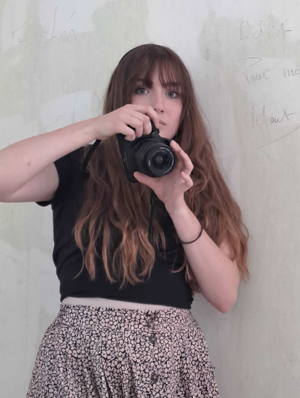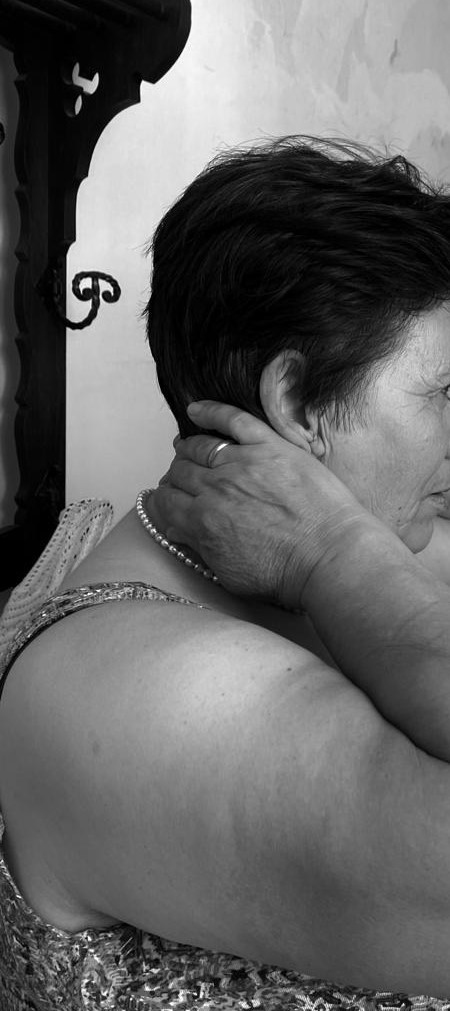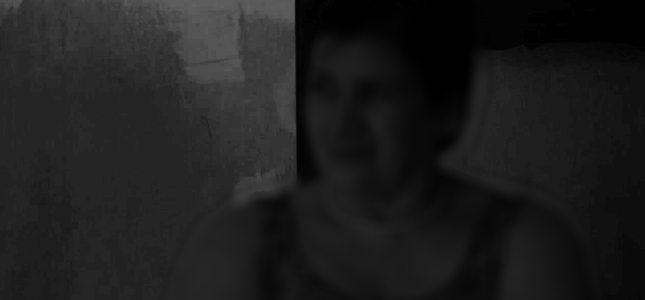I have, in front of me, an abused, isolated woman, dominated by shame and guilt, who fights to keep smiling, despite her hidden misfortunes. But, when I ask if she dreams to work, she responds cheerfully "Yes, yes, yes!”.
By Anastasia Papadopoulos, student, University of Science Po, Nancy. Translation in English from French original by Anastasia Papadopoulos Editor Elda Spaho Bleta

"Covid 19 revealed the true face of the man I gave everything up for." Edona1 decided to leave her birth country at the age of 56 to join her husband, who was already staying and working legally in France. Her decision was made to provide a proper family life for her 13-year-old son, with whom she left Albania. It was the year 2017. After a difficult journey, without a visa but with lots of hope, her regularization does not come. Thus, she is unable to work in France, in the small town somewhere in the Grand Est where she lives with her family. "Each hair on my head represents how many times I have regretted coming to France," she admits.
What is the source of her remorse? Firstly, because she has been in France for 5 years and still does not have her regularization due to a lack of 51 euros per month. Secondly, she discovers an abusive husband ...
A challenging journey
In 2006, Edona marries a man from Kosovo who has been working as a craftsman in France for several years. She was 45 years old, and, after her marriage, she decides to stay in Albania. Her husband leaves for France, as he always does. But, for her, is difficult: she is Albanian, so a visa is required to enter France. Her husband attempts a family reunification procedure, but it was denied in 2009 due to a lack of sufficient financial support.
In 2007, one year after their wedding, they decide to adopt a child, almost a baby, her husband's 2-year-old nephew. His mother had recently died, and his father was unable to provide for his son. "It was me who proposed adopting and educating him. Seeing the child in this situation broke my heart. I wanted to give him a family," she explains. So, her husband would visit Albania for a few weeks each year, before returning to France to work and Edona was alone to raise their son. Even though her situation was far from ideal, she refuses to rely solely on her husband's income. She could not accept her economic dependence; she dreams of emancipation and does not hesitate to sell fruits and vegetables in the street. "I worked all my life, and I was good at what I was doing," Edona recalls proudly this time of her life. "I'm ready to start over. I can't wait."
However, after many years growing up alone with his mother, the little boy starts to ask for his "babush," which means "my little daddy." His father's yearly visits are insufficient for him, and he was also embarrassed by rumors about his family... His mother suffered greatly as well. "Why don't you join your husband with your son in France?" people kept always asking. Pushed by her son, by the public opinion, and tired of the interminable wait, Edona and her son decided to enter France irregularly in 2017. With not very great hope of getting their request for a family reunification procedure accepted. They had been denied in 2009. "Besides, France did not appeal to me. The process of regularization is extremely difficult. I made this decision more for my son than for myself," - she admits.
For just 51 euros more...
The family reunification procedure in France is carried out under strict criteria. According to the Ministry of the Interior's website, a family of two or three people needs a minimum monthly income of one SMIC (minimum monthly growth wage), or €1,302.64 in the 12 months preceding the application2.
Edona’s husband's demand has been denied for financial reasons, for several years. Having in hand his file and all the official decisions made over the years, I read that his income totaled 1,251.33 € per month, resulting in a financial insufficiency of 51.31 € in order to fulfill the criteria for family reunification. Thus, despite the fact that her son has been enrolled in school in France since 2017 and her husband has a resident card, Edona's and her child's illegality is due to a lack of 51 euros per month. Ironically, she cannot contribute to make up for this financial shortfall because no one will hire her if not regularized3. The well-known vicious circle.
Edona is not the only one applying for a visa; in fact, more than 4 million visa applications were registered in 2018, according to data from the Ministry of the Interior. Unfortunately, she is one of the 674,789 visas denied that same year, but she remains hopeful that she will one day be among the visas finally issued in France[3].

Violence and rebellion
When the Covid 19 crisis hits Europe and the worldwide lockdown was declared in 2020, Edona’s spouse's true character gets revealed. It was the first time they spent so many hours under the same roof together. Till that moment, he used to stay out most the time and came just for eating and sleeping. But now, he was obliged to stay in. Furthermore, they didn’t have much money.
"He became even more meticulous than usual," she recalls. – “I wasn't supposed even to touch his belongings. When we were in the kitchen, for example, he preferred to put the spices in the place most convenient for him. When I moved them a few inches and he noticed, he would start hitting me.”. Her husband had never been violent towards her before she went to France. Now, he justifies this abuse of force by blaming her for not working. This pain makes her deeply regret having left her country, Albania.
"You never asked me for forgiveness; you must ask me for forgiveness," Edona says to him, in front of me. When it’s already too late. "I have never cried in front of my husband," she admits, despite her modesty. Her eyes do not lie and reveal her sadness, regrets, and doubts. Even though this Albanian immigrant appears to be cheerful and upbeat, her eyes are filled with nostalgia.
Her only source of fresh air is walking alone. The atmosphere at home is tense. At home, she sobs quietly in her son's arms.
It is only when he raises his hand to the young boy, that Edona finds the strength and the courage to respond to the violence. She accepts to contact the police, she and her son seek refuge in a battered women's shelter. But, in light of her son's fragile health, who lost a lot of weight in three weeks, she decides to return to the family home. Since that day, the man has stopped beating her. It was her first time standing up and saying "no."
Domestic violence, according to French sociologist Daniel Welzer-Lang, is "the paralyzing and destructive use of power by which one person imposes his vision of life on another, forcing her to renounce all ideas and desires that are in opposition to his own, and preventing her from thinking and being herself." Domestic violence is distinguished by the use of force and threat within the family unit, which is shielded by the victims' shame and sense of guilt. Domestic violence can take many forms, including verbal, psychological, physical, economic, and sexual violence4.
This physical, verbal, and economic violence is even more serious for Edona her situation as an illegal immigrant woman in France makes her even more victimized by her husband, who treats her as an object. With no possibility of working and therefore of obtaining an income of her own, the man is in total control of her life. Although he no longer beats her, Edona remains trapped in the house and struggles to overcome the severe psychological violence she is subjected to.
Many women in France are in the same situation; according to the Cadre de Vie et Sécurité (CVS) survey, 102 women died in 2020 from the blows of their partner or ex-partner. 35% of them had previously been victims of violence from their partner. However, the Covid crisis has exacerbated the phenomenon of domestic violence: according to the survey, 159,400 women have been victims of violence committed by their partner, which is 10% more than in 20195.
Indeed, according to data from the anonymous national hotline for women victims of gender-based violence, 3919, the service received 53,264 calls about violence against women in 2020, a 19% increase over 2019. Domestic violence, including marital rape, was cited as the reason for 95% of these calls6.
What happens next? Her son is now 17 years old, and it has been over 5 years since Edona has been waiting for an official response that can regularize her in France. She regularly takes French classes at Secours Catholique Hauts de Lorraine, which helps her integrate and meet new people. She admits that nothing calls her back in Albania from now on, despite her deep regret. Furthermore, the prospect of social pressure frightens her; she cannot return to Albania after failing with her regularization. I have, in front of me, an used, isolated woman, dominated by shame and guilt, who fights to keep smiling, despite her hidden misfortunes. But, when I ask if she dreams to work, she responds cheerfully "Yes, yes, yes!”7.
References
[1] *The name of the person has been change in order to protect the identity.
[2] Ministère de l’Intérieur, Regroupement familial : https://www.demarches.interieur.gouv.fr/particuliers/regroupement-familial#:~:text=L’%C3%A9poux(se)%20ou,mineurs%20(moins%20de%2018%20ans)
[3] Ministère de l’Intérieur et des outre-mer, Direction générale des étrangers en France :Présentation / La Direction générale – Direction générale des étrangers en France – Ministère de l’Intérieur (interieur.gouv.fr)
[4] MANSEUR Zahia, Entre projet de départ et soumission : la souffrance de la femme battue, 2004 : Entre projet de départ et soumission : la souffrance de la femme battue | Cairn.info
[5] Ministère de l’Intérieur et des outre-mer, Les violences conjugales enregistrées par les services de sécurité en 2020 : Les violences conjugales enregistrées par les services de sécurité en 2020 | Ministère de l’Intérieur (interieur.gouv.fr)
[6] Solidarité Femmes, 3919 : Fédération Nationale Solidarité Femmes | Appels au 3919 en 2020 : … (solidaritefemmes.org)
[7] This article is written in June-September 2022. During its finalization, in September 2022, Edona finally receives its first receipt from the prefecture.
*This article is produced as part of the “Coming together, telling stories, getting mobilized” project, a partnership between the PRO IDE information platform and the Secours Catholique Caritas Hauts de Lorraine, with the financial support of the latter. It was written by Anastasia Papadopoulos, student at Political Sciences university Paris, campus of Nancy, volunteer (2022) with Secours Catholique Caritas Hauts de Lorraine, and edited by Elda Spaho Bleta, journalist, founder of PRO IDE. The sources of the information are quoted, and when an opinion is given, it engages only the author. The content of the articles does not engage the previously named structures.

